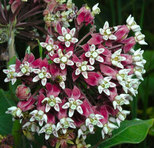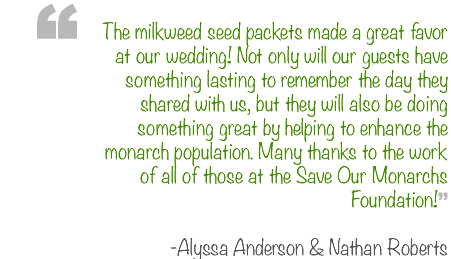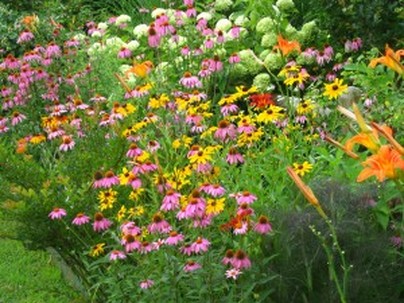Monarchs Need Milkweed

Milkweed for Butterflies
Monarch caterpillars ONLY eat milkweed. In fact, the monarch butterfly is also known as the “milkweed butterfly.” The milkweed plant provides all the nourishment the monarch needs to transform the Monarch caterpillar into the adult butterfly. But these plants are rapidly disappearing, due to the loss of habitat stemming from land development and the widespread spraying of weed killer on the fields where they live. It’s easy to grow your own Milkweed! There are many varieties of milkweed. There are some which thrive in full sun, in humid conditions and even in very dry conditions. As a perennial, they will come back every year, despite harsh winter conditions. They typically bloom rosy pink flowers, and are the preferred host plant for the monarch butterfly. To find out more about the various species of milkweed and which are best for your area, check out this factsheet courtesy of Monarch Joint Venture. IMPORTANT NOTE: The species of milkweed we offer is Asclepias syriaca. Planting this variety of seed in a dry sandy location, particularly in the southwest United States, will not produce a successful planting. How to Grow Milkweed
Germination rates will be greatly reduced if not planted correctly. Milkweed seeds can be very slow to germinate and does take some time and patience. For best results and to speed up the germination process, place the seeds in wet paper towels in a plastic bag in the refrigerator for 30 days prior to planting. Then plant the seeds in a sunny place about 1/2" deep and water them for at least two weeks. After about two months, your milkweed plant will be big enough for caterpillars to eat. Monarch caterpillars are eating machines; each one will each mow through about 20 leaves. So make sure you have enough milkweed plants or the caterpillars will starve! Milkweed plants are food for caterpillars but poisonous to humans. Do not get milkweed sap on your skin or in your eyes. Milkweed is also toxic if eaten, so keep plants away from young children and pets. |
Credit: Pheasants Forever Butterfly Gardens
After it becomes a butterfly, the monarch has a much more varied diet. It starts out extracting the nectar from the milkweed flowers. But butterflies consume nectar from many different plants. If you plant these in your garden you will attract butterflies. Annuals
Coneflowers, impatiens, marigolds, phlox, sunflowers, and verbena Perennials Asters, bee balm, butterfly weed, chrysanthemums, daisies, purple coneflower, sedum and yarrow Wildflowers New England aster, bergamots or horsemints, black-eyed Susan, blazing stars, boneset, butterfly flower, coreopsis, ox-eye daisy and purple agertum Fruits Adult monarch butterflies also like to feed on banana, oranges and watermelon. |



